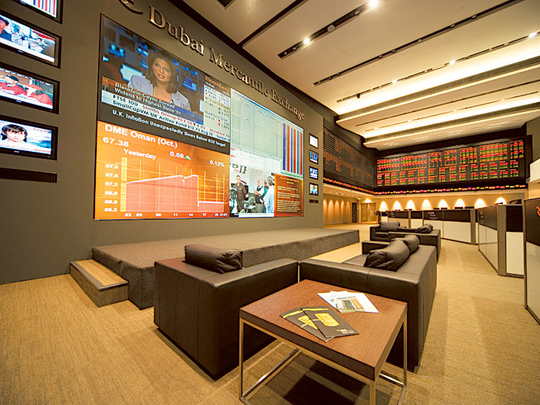
Dubai: Dubai Mercantile Exchange aims to become a multi serviced platform and plans to launch more financial and energy products, as well as agricultural commodities and metals even as it’s current priority is to strengthen the physical spot oil contract, a senior official told Gulf News.
“We would love to have financial and energy products, agricultural commodities and metals. Currently, we are going to start in energy, we want to look at more crude products, more refined products. We are also taking interest in agricultural products, and beyond that we would be interested in equity indexes and equity index futures. I want this to be multi serviced platform and not just an oil platform,” Owain Johnson, managing director, Dubai Mercantile Exchange told Gulf News.
But currently, the exchange plans to focus on strengthening of physical spot oil contract after having record physical trades. The exchange delivers Oman oil and has a delivery centre there, servicing part of Oman’s 1 million barrel per day of oil.
“Even though oil prices have fallen, 2015 has been the best year in 8 years. We are doing more physical trades than they ever did before,” Johnson said.
January was the best month in history and April was the second best month in terms of volumes, as more and more traders sought physical oil.
“People are going back to basics, earlier people were trading speculative and now with new oil prices and new scenario they are going back to basics,” Johnson said.
The DME is the world’s largest physical oil exchange in the world, and caters to demand from Asia (mostly China), Japan, Taiwan, Korea Malyasia and Singapore. China buys about 80 per cent from DME.
“The exchange mechanism is getting more popular, and prefers more bilateral agreements, but now with credit risk people prefer to buy from the exchange as it guarantees performance. It’s more appealing in a difficult market,” he added.
Performance driver
The physical trade is driving the performance at DME despite little storage facilities, however Johnson expects more volumes once more storage facilities come on board.
“I would like to build on the success of the physical market, and launch new products. We don’t have any storage now. Oman is developing a storage facility. The land storage would be operational in 2018, and floating storage is also expected in Oman.
“With the storage the oil would go from the terminal to a tank, so every time there is more trading then there is a multiplication factor,” he added.
Johnson expects double digit growth in value in overall volumes.
Overall volumes are 7 million barrels per day on the futures exchange, and the physical volumes are about 15-20 million barrels a month.
More products
“We would see more products this year, mainly crude products and refined products mainly in the petroleum space,” Johnson said.
The exchange has started getting clients from the US in addition to the existing strong clients in Asia, the Middle East, and London.
Plus volatility is also driving up demand.
“I have Brent in Europe, and there’s record buying in China. With difficulties in Yemen, Iraq, and Syria, what does that mean for Middle East oil and how do I trade Middle East oil? Traders are thinking of DME. If China is going to be bigger than the US, then may be I want to buy China contract, sell US contract, and sell European contract and buy Middle East contract,” Johnson added.
Benchmark price
However, the exchange’s ambition is to set the benchmark in crude prices.
“What we need is an agreement, and how we want to proceed because at the moment China has a very strong idea of how they want prices to develop, and they want to build an exchange in China, and want to dominate prices from China. Oman and Dubai have made that decision, as they want pricing in the GCC, and we now wait to see if others in the region will accept the strength of the Chinese or fight to keep the benchmark here,” Johnson said.
“If buyers become dominant and buyers set the price, that’s not positive for the region. If we don’t create a benchmark here, then the benchmark moves to Shanghai. If pricing power moves to a buying country, that is negative for us,” he added.
Chicago Mercantile Exchange (CME) has a 50 per cent stake in DME, with Oman’s sovereign wealth fund owning 29 per cent stake, and Dubai Holding owning 9 per cent stake.







